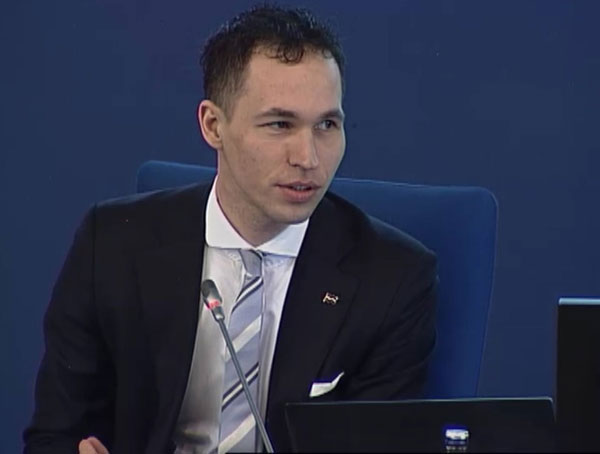Māris Andžāns: A Baltic View of the China-EU Relations and 16+1

Q: Based on your own observation, how the 16+1 cooperation framework is perceived in the EU, or in the Baltic nations or in Latvia?
A: Situation is diverse in individual EU member states. Generally, in my view, in the EU the "16+1" cooperation framework lacks visibility beyond officials, entrepreneurs and experts interested in relationship with China. In some fields, especially the economic, the initiative entails more opportunities while in others it entails more risks as the initiative seems to be an integral part of the expansion of China’s soft power and economic power.
In Latvia, from the perspective of those who have knowledge of and interest in this cooperation framework, it is usually perceived as a format through which to expand the economic cooperation with China. In particular, to expand Latvia’s export to China and to attract cargo in the transportation through Latvia.
Q: What should China do more to make the 16+1 more fruitful?
A: There is no such regional constellation of these 16 countries apart from the “16+1” framework. By this I mean that these are rather different countries – e.g. members and non-members of the EU and NATO, with different levels of economic development and structure of economy, nations with different mentalities, etc. Therefore, these countries have also different priorities and/or different levels of aspirations in cooperation with China. At the same time, they do compete with each other in spheres where their interests with regard to China converge, like importing goods in China or attracting investment from China. Therefore, a regionally and sectorally more focused approach by China could be useful.
Secondly, and related to the first question, raising of awareness of the format could be helpful to make it more productive.
Thirdly, the mutuality and reciprocity of the relationship between China and the European states should be underlined and expanded. In different spheres, China can gain considerably from the experience and expertise of the 16 countries.
Q: The next 16+1 summit will be held in Latvia. What can be expected from the gathering?
A: Probably Latvia, China and other countries comprised within the format will strive to deliver some practical outputs over the course of the summit. However, I would not expect the summit as such would bring notable practical deliverables. Rather, it could fix the current state of play on the implementation of Suzhou guidelines and sketch some further lines of targets and priorities.
From the perspective of Latvia, the summit will be a valuable opportunity to underline Latvia’s interests in the economic cooperation with China – primary to expand its export of goods to China, to offer services such as tourism and its inland surface and also air transportation infrastructure for transit of China’s cargo to the West.
Q: It's more than 2 years since China put forward the belt-road initiative. Are people in the Baltic interested in it? How much do they know about its meaning?
A: “One Belt, One Road” and transportation issues within it are one of the central if not the very central point of interest in Latvia towards the cooperation with China. Transportation sector is a significant part of the economy of Latvia. At the same time, it is one of the few that are still heavily dependent on Russia and to a lesser extent to some other CIS countries. Latvian ports and railroads still function as one of their “export gates” to the West. Given the unstable environment in some of the neighboring countries and the controversial political climate in relationship with them, it is important for Latvia to diversify sources and routes of cargo. China’s cargo can be considered as the only notable alternative for the Latvian inland surface transportation infrastructure. In addition, it is important to note that in this May Latvia will launch the Secretariat on the cooperation in transport and logistics for “16+1” countries.
At the same time, I think there is considerably smaller awareness of other elements apart from transportation and logistics that make up the “One Belt, One Road” initiative.
Q: China and the EU agree to create synergy between the belt-road initiative and the Juncker Plan. How can it be realized?
A: The so-called “Junker Plan” has received different verdicts in the EU, and fortunes or misfortunes of it are still to be seen. However, it is yet early to judge this initiative.
There might be ground for a win-win synergy with other countries, China among them. However, the cooperation should be implemented on a case-by-case basis where mutual benefit would be possible, and, at the same time, by avoiding special treatment of some particular investors. One of possible risk factors in implementing common projects is differences in perceptions of investors from other regions in implementing projects in the EU when it comes to procurement procedures and standards.
Q: How do you look at the China-EU relations today?
A: China is rising in its power and it will further build its economic power that in the turn will continue to underpin its political and military power. Therefore, dialogue between the EU and China will gradually expand in the fields where interests converge, especially in the economic sector. At the same time, when it comes to cooperation in other fields, as a minimum, a slight suspicion in the relationship will remain.
It is also important to note the limitations of the common foreign policy of the EU and its interaction with foreign policies of individual members and their priorities.
(Māris Andžāns is Research Fellow at the Latvian Institute of International Affairs. He also serves as Assistant Professor at Rīga Stradiņš University.)
- Back _articles: Insa Ewert: More Concrete Actions to Realize the Four Partnerships
- Next _articles: Jim Stoopman on China’s “One-Belt-One-Road” Initiative